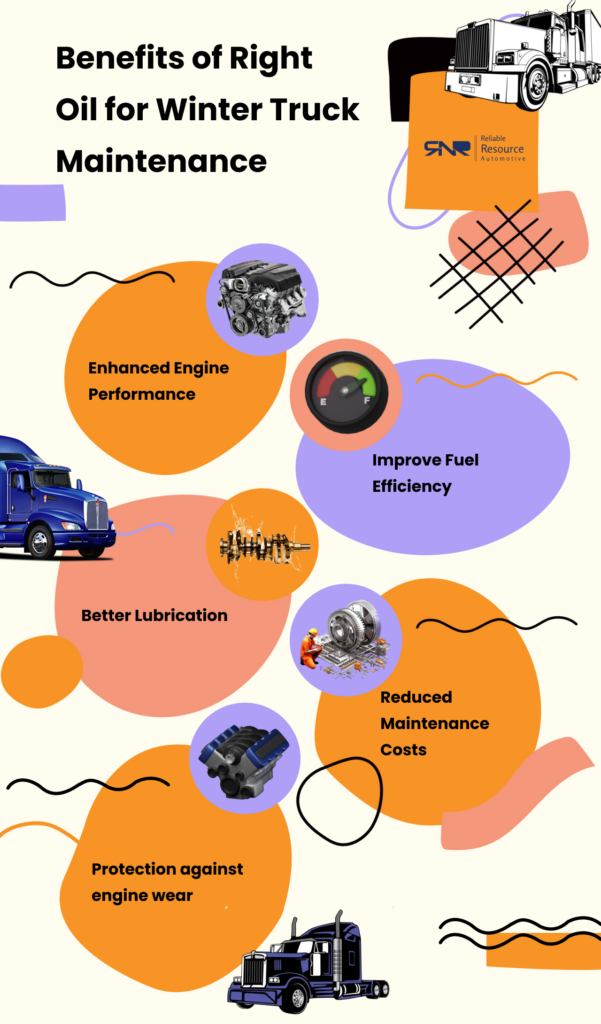Which Oil is The Best for Winter Truck Maintenance?
September 27, 2024
Would you believe me if I said that each season requires different oils to protect your engine? Absolutely, yes, as it’s an actual reality. So, which oil are you using for winter truck maintenance? You may need an expert opinion to pick the right one, as winter is a harsh reality that needs to be faced rigorously.
I’ll discuss the different types of oils required in various winter conditions later, but do you know why? As the temperature goes down, the oil consistency gets thick, making it hard to accelerate the engine for a smooth truck journey. The truck requires a specific medicine known as W-Engine Oil to avoid all these issues.
This guide will share insights about the best-suited engine oil for winter truck maintenance and to gear up for the truck journey.
How to choose the best Oil for Winter Truck Maintenance?
Choosing the best truck oil for winter is as important as buying a woolen sweater for going out in the freezing winter. I’m focusing on this because selecting a conventional oil doesn’t work well; the engine requires extra special treatment in winter, as does your skin.
Oil Viscosity and Winter Grades
Viscosity is an arbitrary resistance to flow. It becomes more prominent in cold weather as oils naturally thicken, impeding their ability to circulate and protect the engine. To maintain the engine’s significant health.
Oil is classified with a two-number system, first as 5W-30 or 10W-40. The first number shows how the oil flows at cold temperatures, whereas ‘W’ stands for winter, while the second reflects its flow at a high operating temperature. A lower “W” indicates better flow because oil remains thinner and flows more easily in cold weather.
Synthetic Vs. Conventional Oil
Synthetic oil comes in the first row each season to indicate high performance, as it has clear advantages over conventional oils. These oils are engineered to perform excellently in extreme hot and cold temperatures. They have superior flow characteristics at low temperatures, ensuring each engine component is well-lubricated even during a cold start.
Conversely, conventional oils tend to thicken in cold weather, increasing engine wear-tear during startup. If you’re operating your truck in a region where harsh winters are the norm, synthetic oil is often the first choice for maintaining engine health.
Best Oil Types for Winter Truck Maintenance
In this segment, we will understand the best-suited truck oil change and type for your engine health and expand your truck business with quality services.
Below are some recommendations for buying engine oil
List of Synthetic Truck Oil for Winter
0W-20 Synthetic Oil: The synthetic oil for winter is great, as it provides excellent low-temperature performance, ensuring quick starts and proper viscosities.
5W-30 Synthetic Oil: This versatile oil is suitable for a wide range of temperatures, from extremely cold to moderate; it can be used without hesitation.
0W-40 Synthetic Oil: This oil is easily workable in an extremely cold environment. It perfectly balances cold-weather performance and temperature protection, ensuring fuel efficiency.
5W-40 Diesel Engine Oil: This oil is specially made for diesel engines. It offers an excellent cold start to the engine and protects against wear in sub-zero temperatures.
Factors to Consider while Choosing Winter truck Oil change
Oil Standards: Have you ever taken a deep interest in the coded words written over the engine oil while making a purchase? API, ACEA, and ILSAC are engine oil standards. This means the engine has satisfactorily passed these organization standards and is now completely ready to engage with your engine. These specifications play a crucial role as they reflect the performance and exponential quality of the engine.
Note: API (Americal Petroleum Institute) and ACEA (Association des Constructers Europeens) are extensively used standards.
Viscosity Ratings: If you’re new to or unaware of viscosity ratings. You might encounter confusing codes on engine oil’s product packaging. Have you ended up in misery?
Now, don’t let it happen to you again. Those numbers are known as viscosity grade and the induction of the oil flow during freezing winter. If looking for the best engine oil in winter, it is obvious to look at these numbers, as they closely align with driving conditions and weather.
Types of Engine: Make a wise decision to pick the right set of engine oils to enhance the quality of the vehicle, engine lifespan, and overall health. Always gather the information properly that suits your purchase effectively.
Driving Environment: It is essential to consider the circumstances in which you drive primarily, regardless of whether you live in hot or cold conditions and paved or unpaved road scenarios. Considering the driving environment is as mandatory as the key for the truck, as it helps in enhanced and trouble-free driving.
Benefits of Using the Right Oil for Winter Truck Maintenance
There are numerous benefits to choosing the right oil to go along with the truck’s goal. The right engine oil at the right time can efficiently lubricate the mechanism and prove best for the row.

Enhanced Engine Performance: It is essential to choose when selecting engine oil. For example, using a winter-grade oil, such as synthetic oil designed for low temperatures, helps maintain fluidity even in freezing conditions. It ensures that your engine starts smoothly and operates efficiently in any season.
Improve Fuel Efficiency: Using thick oil can increase drag, reducing fuel efficiency. The right winter diesel engine maintenance ensures that your engine operates with minimal friction, which helps maintain optimal fuel efficiency. These precautions are crucial during winter when fuel efficiency can decline due to freezing temperatures and increased engine workload.
Better Lubrication: Using conventional oil in winter sessions can fail to circulate properly, leading to improper lubrication in the engine. This causes increased wear and tear on engine components. Winter-specific oils like synthetic ones come with a formula to death that is better at lower temperatures, providing and reducing the risk of engine damage.
Reduced Maintenance Costs: Using the right oil can be effective, as the need for repairs and truck maintenance service decreases substantially. By ensuring that your engine is well-lubricated and protected, you can easily run your truck without fear of any cost or damage caused by improper oil use.
Protection against engine wear: As the right partner protects, the right engine oil protects you against engine wear. Winter-grade oils are designed to resist sludge formation and deposits that can occur during cold starts. This helps protect vital engine parts from excessive wear and prolongs their life.
Where to Get the Best Oil for Your Truck in Winter
RNR truck repair shop covered a complete dimension after determining which engine oil is best suited for picking the right one. To take action, knowing where we can buy the best oil for the truck is mandatory. To cope with this, you can check at reliable resource automotive, as we provide the best and under-the-budget synthetic oil.
Our engineered trainers can also check the engine condition while poring the oil, so if anything needs to be fixed, we stand beside you as your long-journey partners; therefore, choose wisely.
Conclusion
To conclude, Use synthetic engine oil for lubricating, accessible, and long road journeys even in harsh winter. These engine oils are the only things that can save your truck’s overall performance while maintaining fuel efficiency, better lubrication, and keeping you on a long track.
Besides this, while giving the oil a green flag, check the inlined factors around your areas or where you drive most. For instance, if you drive in the harsh winter, follow the above engine to push your journey smoothly.
Frequently Asked Questions
What is the best engine oil type for winter truck maintenance?
Synthetic oil is the best-suited, without any doubt, and widely accepted engine oil for winter. Its magnificent performance helps lubricate each engine component and maintains easy engine oil flow at the lowest temperature; synthetic oils are an excellent choice for winter.
Why is only synthetic oil mostly recommended for winter use in trucks?
Choosing synthetic oil over conventional oil is a strategic decision to save your engine from wear and tear due to low temperatures. Synthetic oil is only recommended because it improves fuel efficiency even in adverse weather.
Can I use the same engine oil year-round or change it for winter?
Some engine oils are designed to fulfill the customer’s needs simultaneously, and synthetic is one of them. It can be used in colder to hotter weather, though its major specialty is winter, which helps your engine start more easily in cold weather.
